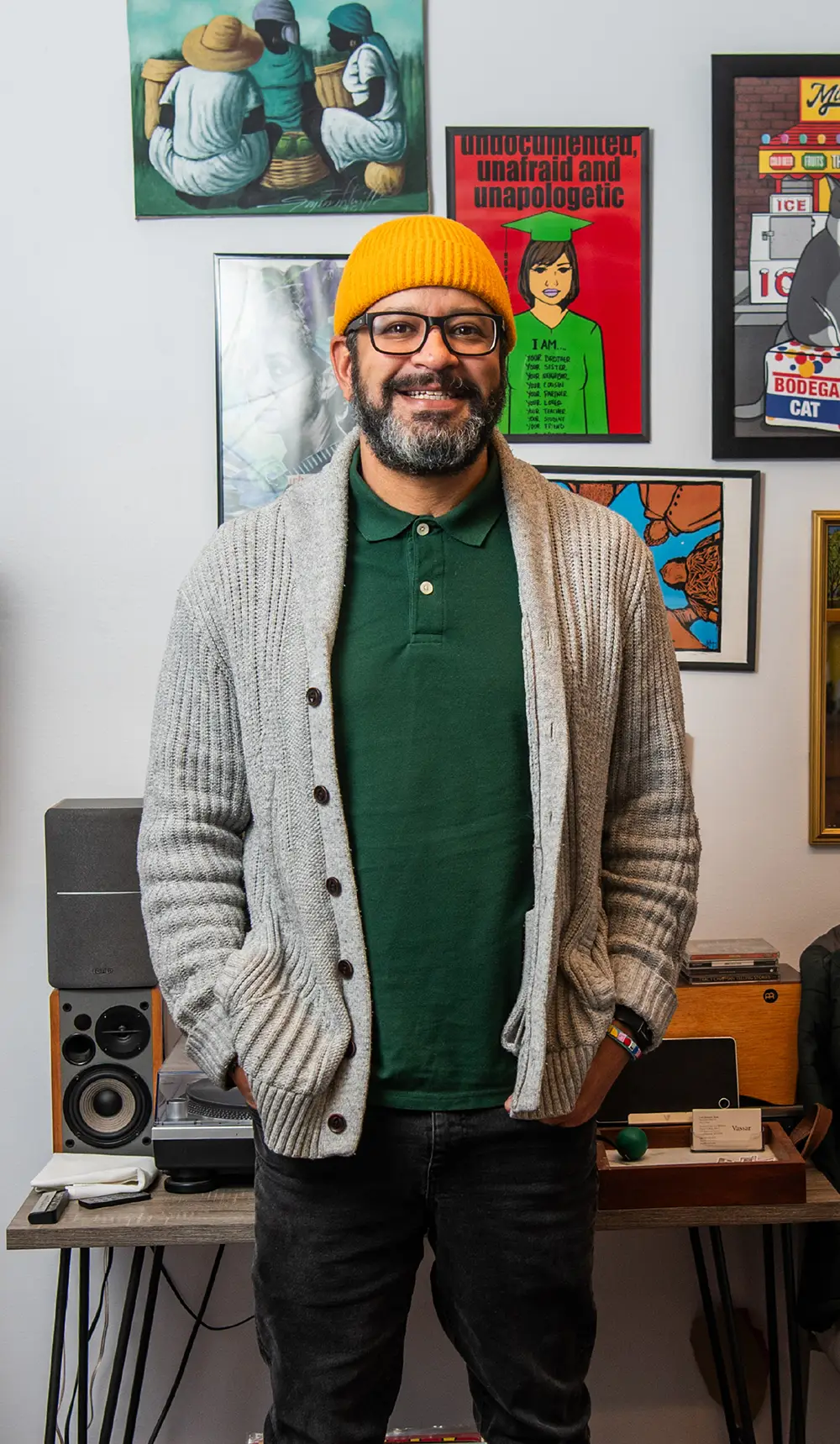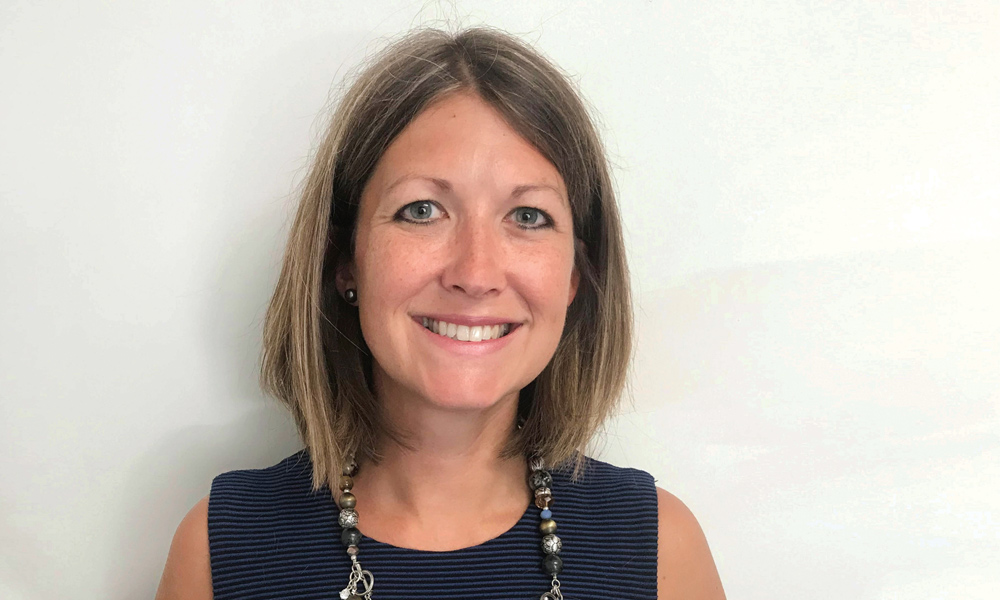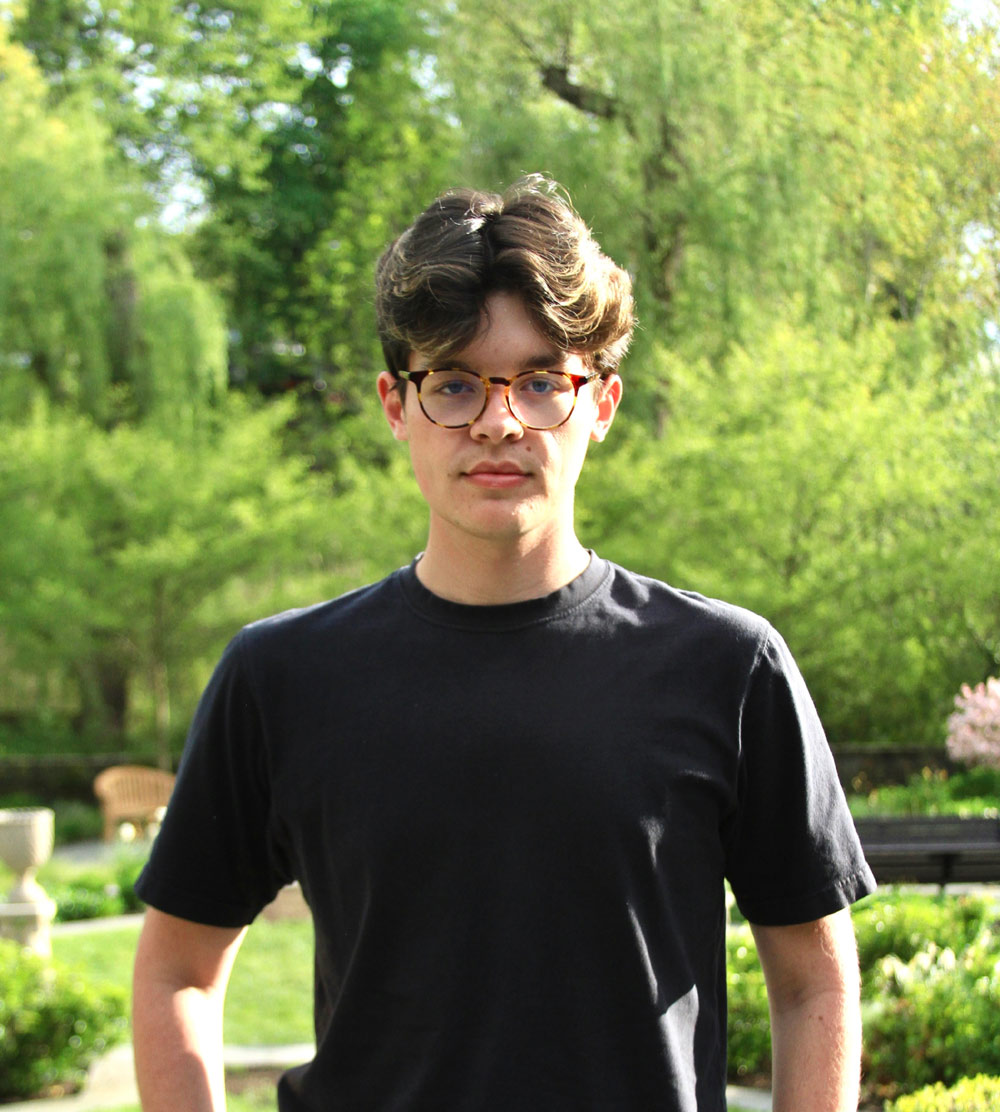
Wellness
Champions
Luis Inoa

The Jewish Education Project, formerly known as the Board of Jewish Education, provides professional development and resources for educators working in early childhood centers, congregations, day schools, and youth programs. Inoa was nominated for the award by the Academic Engagement Network (AEN), an organization dedicated to mobilizing university faculty and administrators to address antisemitism on campus.
Following the October 7 attacks, Inoa participated in a series of AEN workshops focused on creating safer, more inclusive environments for Jewish students and others.
“It’s an honor to receive this recognition,” Inoa said. “Supporting Jewish students, including Zionist students at Vassar, is important to me. My support is for our students—many of whom are deeply conflicted and seeking just and peaceful resolutions and needed spaces to be able to express that. I am grateful that they trusted me.”
Inoa also expressed a personal commitment to ongoing learning. “I’ve worked hard to understand antisemitism, the history of Israel and Palestine, and what it means to support all students affected by the current conflict,” he said. “This award is not just about my work—it’s a reflection of the collective efforts of our administration, including Dean of the College Carlos Alamo-Pastrana and President Elizabeth Bradley, to care for our students.”
The award included a $2,000 stipend, which Inoa split between campus initiatives and a donation to Roots—a grassroots organization fostering understanding, nonviolence, and transformation among Israelis and Palestinians through dialogue and collaboration. The group’s programs bring individuals from both communities together to explore what it means to share the land they call home.
“This recognition underscores the importance of making space for difficult conversations,” Inoa added. “While I’m still learning, I remain dedicated to this work and to ensuring our campus is a place where all students feel supported.”
Margot Schinella ’06

But it was a bit later in her career, as a family nurse practitioner, that Schinella found her calling: caring for college-aged young adults. “So much of health care is about fixing health problems, but with this age group, you can really focus on teaching them how to promote wellness in their life, so they don’t end up with multiple comorbidities later in life,” she says.
Yet promoting overall wellness wasn’t first on the priority list when Schinella started working at Vassar in 2020, during the height of the COVID-19 pandemic. “The campus was still shut down, and everyone was isolated—at least at first,” says Schinella.
But as the world opened up again, Schinella was able to push her agenda forward, which included raising students’ awareness of preventative health measures they could take to keep themselves thriving over the long term. “Learning doesn’t just begin and end in the classroom,” she says. “My goal was to provide health education through a variety of means such as screening events on campus, including those for breast, chest, and testicular cancer, along with pop-up vaccine clinics and a newly launched Instagram account that provides routine health care tips.”
Schinella coordinates the Mindful Eating Support Team (MEST), a new initiative that provides individualized counseling, monitoring, support, and care to students struggling with body image issues, nutritional concerns, and disordered eating patterns. A team, including medical, mental health, exercise and nutrition experts, works to schedule on- and off-campus nutritional and counseling support and specialists. “We meet with students individually and connect them with the type of care they are seeking using a patient-centered and collaborative structure,” says Schinella. Referrals to MEST have dramatically increased as the program becomes more widely known, according to her.
That kind of holistic approach extends to mental health, too: “Essentially, all of us are working toward the same goal, which is promoting health in every dimension of life—physical, mental, emotional, financial,” says Schinella, who runs half-marathons and kayaks to keep herself healthy.
Connor Dalgaard ’26

As an active member of his Pittsburgh high school’s mental health club, he organized events to raise mental health awareness and hosted roundtables with teachers. “In high school, you don’t always think of your teacher as a real person,” he says with a laugh, “but when you look at them eye-to-eye, it’s easy to see how we all have our own mental health struggles.” When COVID-19 ended these activities, he looked beyond school for ways to be active, including becoming a member of the PA Youth Advocacy Network.
Then, as a Vassar first-year student, he immediately sensed that he could take his activism to a new level at his newfound home. “From the first day I met my student fellow group, I felt so at home,” Dalgaard recalls. “Whether walking around the Preserve or exploring the Hudson Valley—the atmosphere has really allowed me to flourish.”
Dalgaard was also drawn to Vassar’s Listening Center (TLC), a text hotline where students can reach out to their peers anonymously to vent and get support from 8 p.m. to midnight. “Mental health crises don’t just happen Monday to Friday, from nine to five, when counseling services are open,” says Dalgaard, who, as VP of TLC, oversees the training and scheduling of student listeners. “Sometimes, you just need to connect with a person your age, who will understand the ‘Vassar-ness’ of a situation and won’t judge you.”
With support from the Office of Community-Engaged Learning, Dalgaard has interned with the Bazelon Center for Mental Health Law and been one of nine youth advisors to NAMI (National Alliance on Mental Illness) New York State. Now, he is doing a gap semester to intern for Inseparable, an advocacy organization that works to reshape the public policies governing mental health care across the country. Just recently, NAMI Keystone awarded Dalgaard with the 2025 Youth Mental Health Leadership Award. “Through NAMI-NYS, I created a podcast episode on stress among college students, which was shared across New York State,” he says.
But perhaps the most surprising connections to Dalgaard’s passion for mental health activism have been found in the classroom. “For my First-Year Writing Seminar, I randomly took a Greek and Roman studies course, and I was in awe when, in The Iliad, I read about Achilles’s elaborate grief rituals after Patroclus died, which connected to what I was learning in my physiological psychology class about elephants’ grieving rituals—the way, after a death of another elephant, they vocalize, approach the body, try to revive the animal, or remain with the body. It made me wonder if our modern grief rituals like funerals, lamenting on social media, and then immediately going back to work or school are as effective.” Another lightbulb went off when he took Advanced Topics in Health Economics and Policy, where he learned to make the case for investing in mental health support. “All these classes have allowed me to make critical connections and given me an unconventional perspective as a young mental health activist. I have Vassar to thank for that.”
Mariam Eshetu ’24

“These colleges were really proactive in terms of their mental health approaches,” said Eshetu. “Vassar does the same thing here.” This network of support enables students to not only stay in college but to thrive. Eshetu said she took advantage of Vassar’s mental health support early in her college career and found it very helpful.
These findings support other research that connects better mental health support with higher graduation rates and fewer students who drop out.
She also learned that too many people separate mental health needs from everything else, but in reality, mental health can be the root cause of a lot of issues.
Eshetu, who graduated from Vassar with a BA in psychology and a correlation in education, is currently the middle- school coordinator for the Vassar After School Team (VAST), which connects Vassar student volunteers and Poughkeepsie Middle School scholars for tutoring and mentoring. She is applying to graduate schools and eventually plans to pursue a PhD. Her goal is to work with middle-school students and conduct additional research on pre-teen and teen mental health.
Nina Smiley ’73

The College’s physical campus also helped nurture Smiley’s passion for nature. “Whenever I’d stroll through the Shakespeare Garden, there was a sense of discovery,” she says. “What I loved is that you could be present in the world of Vassar and also in the world of nature, discovering new things.”
One discovery she made soon after graduation was Mohonk Mountain House, a resort across the river owned by the family of her then-boyfriend and soon-to-be husband of 45 years, the late Bert Smiley. Mohonk, it turned out, had a history intertwined with Vassar. “Both were founded in the 1860s, and, back then, graduating seniors would come over to the resort to relax and celebrate,” Smiley says.
After a peripatetic career that included teaching college psychology, conducting marketing focus groups, and working at a think tank for the AARP, she and Bert decided to become Mohonk’s innkeepers. “I realized that I had an opportunity to share my love of nature and mindfulness meditation with our staff and guests,” she says. With her twin brother, Smiley coauthored three books on mindfulness, including Mindfulness in Nature, MetaPhysical Fitness, and The Three-Minute Meditator, which has been translated into seven languages.
At Mohonk, Smiley puts her passion for mindfulness into action, taking guests on “forest bathing” expeditions around the 1,200-acre property. “To be outdoors and feel the air on your skin, to smell it, to hear the sounds around you, that’s when the body begins to relax in a powerful way,” says Smiley. “So many studies have found that being in nature, or even seeing a tree out a window, can have a significantly positive impact on well-being.”
Smiley has also brought her passion for nurturing well-being to Vassar, including doing programs on resilience with Michele M. Tugade, PhD, a Professor in the Department of Psychological Science. “We did one during the pandemic on resilience, mindfulness, and wellness to offer support to the Vassar community,” says Smiley. “The wonderful thing about nature and mindfulness is that both are practical and accessible—I always tell people that they’re for real life, in real time, for real people when they really need it.”